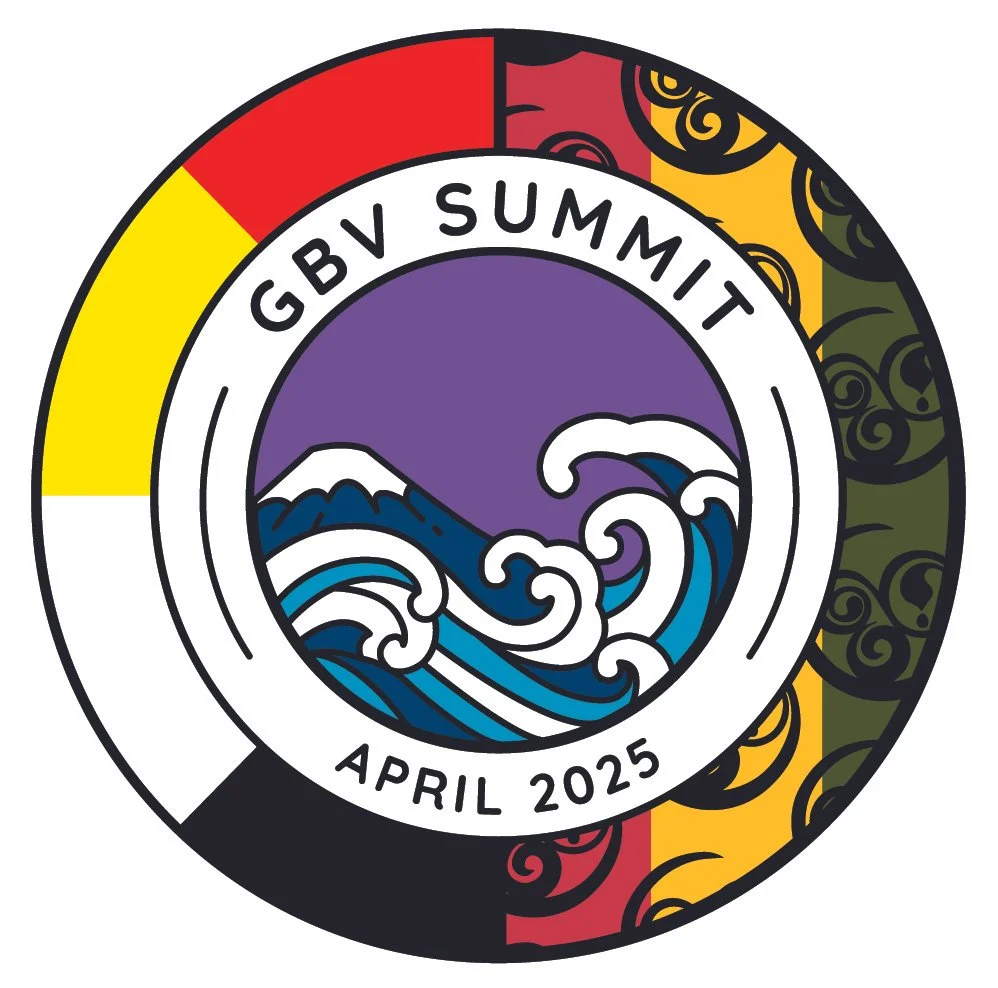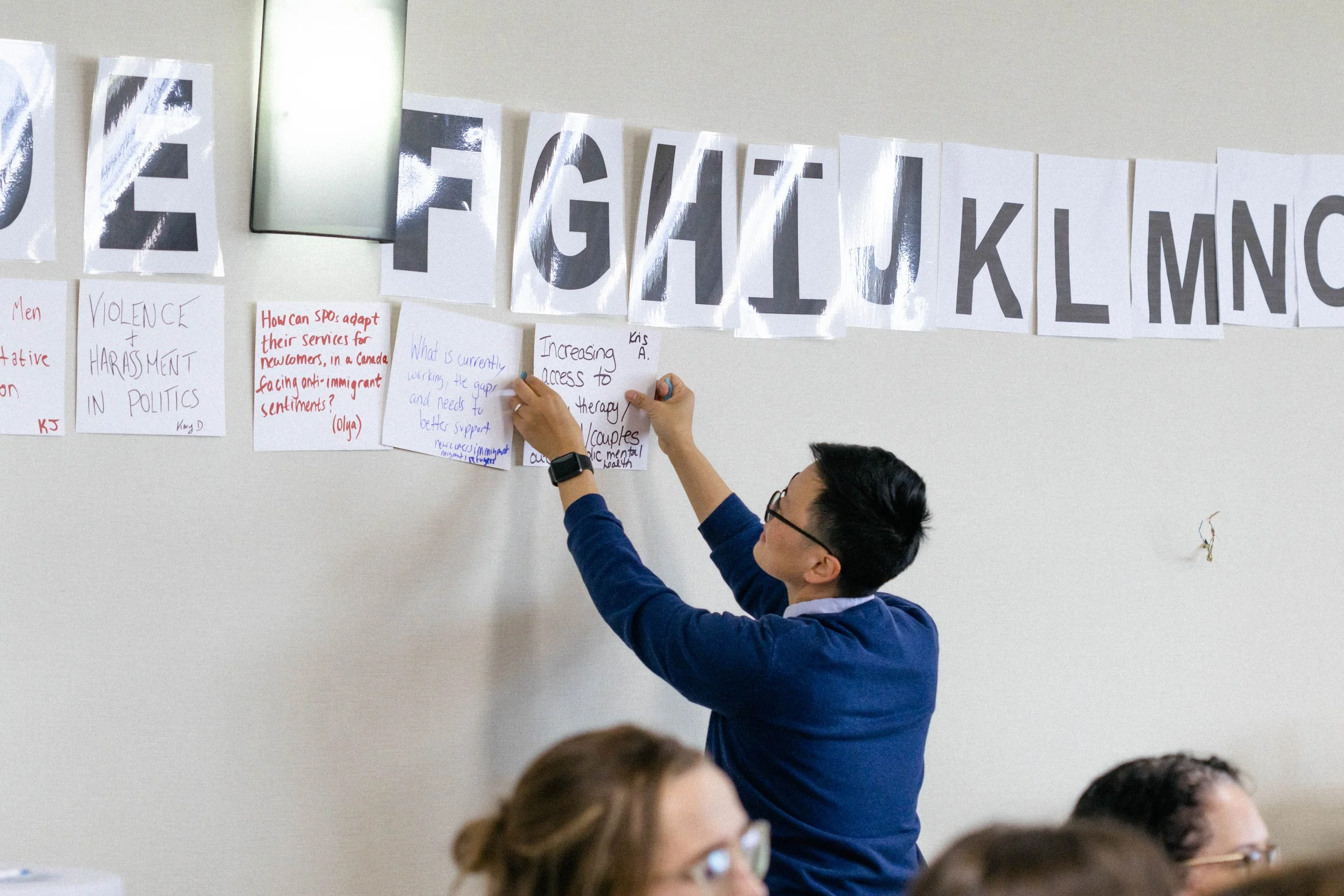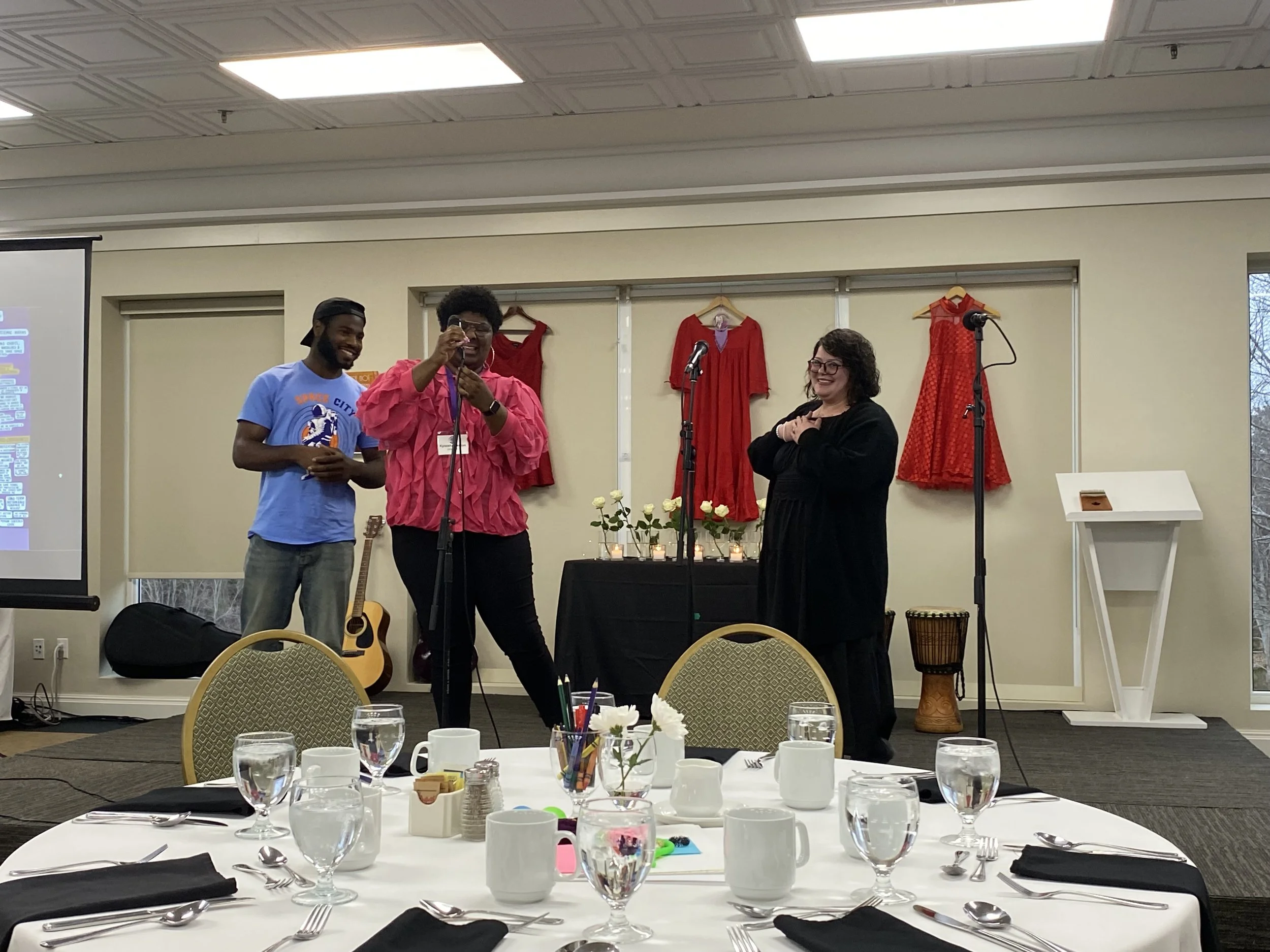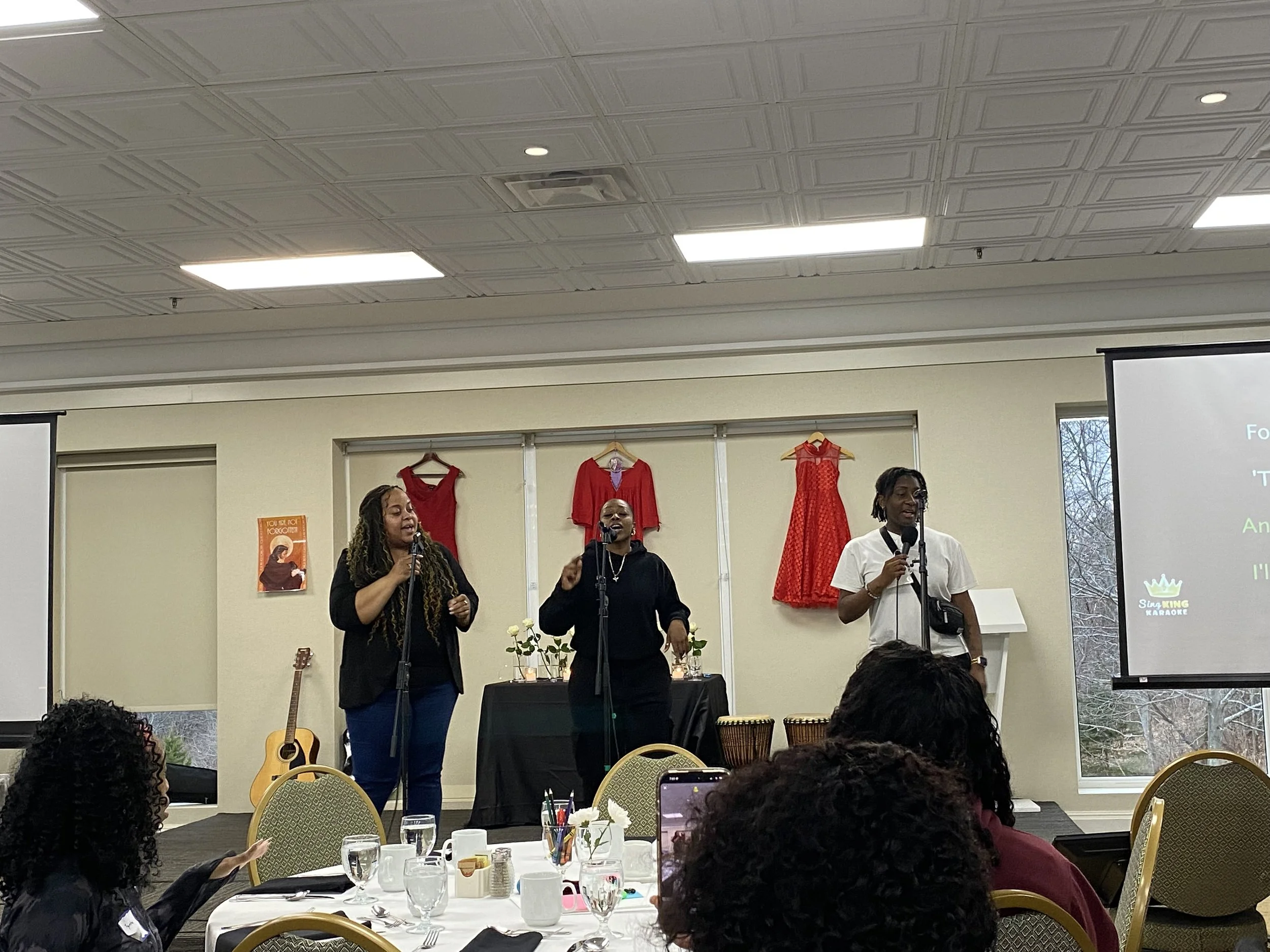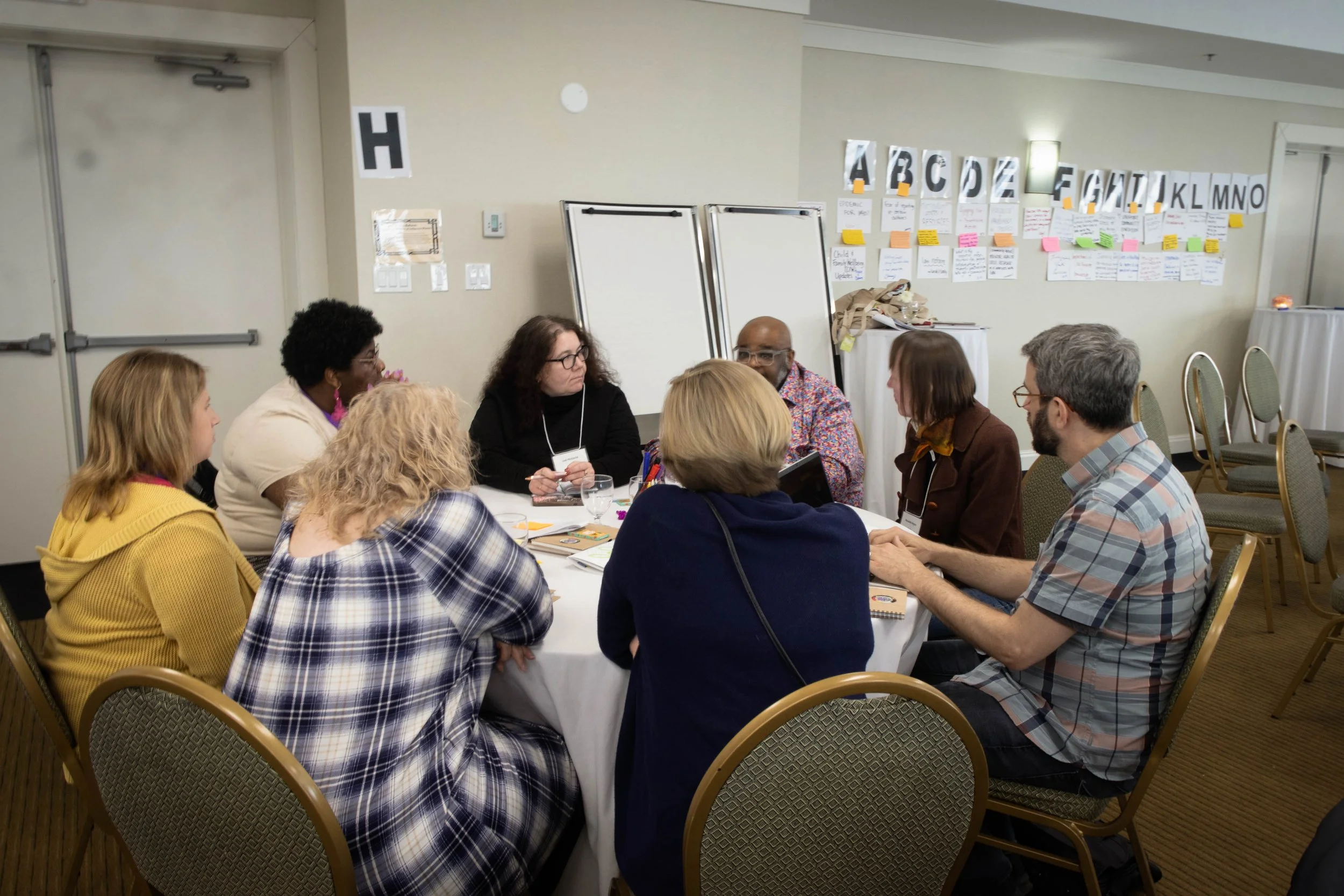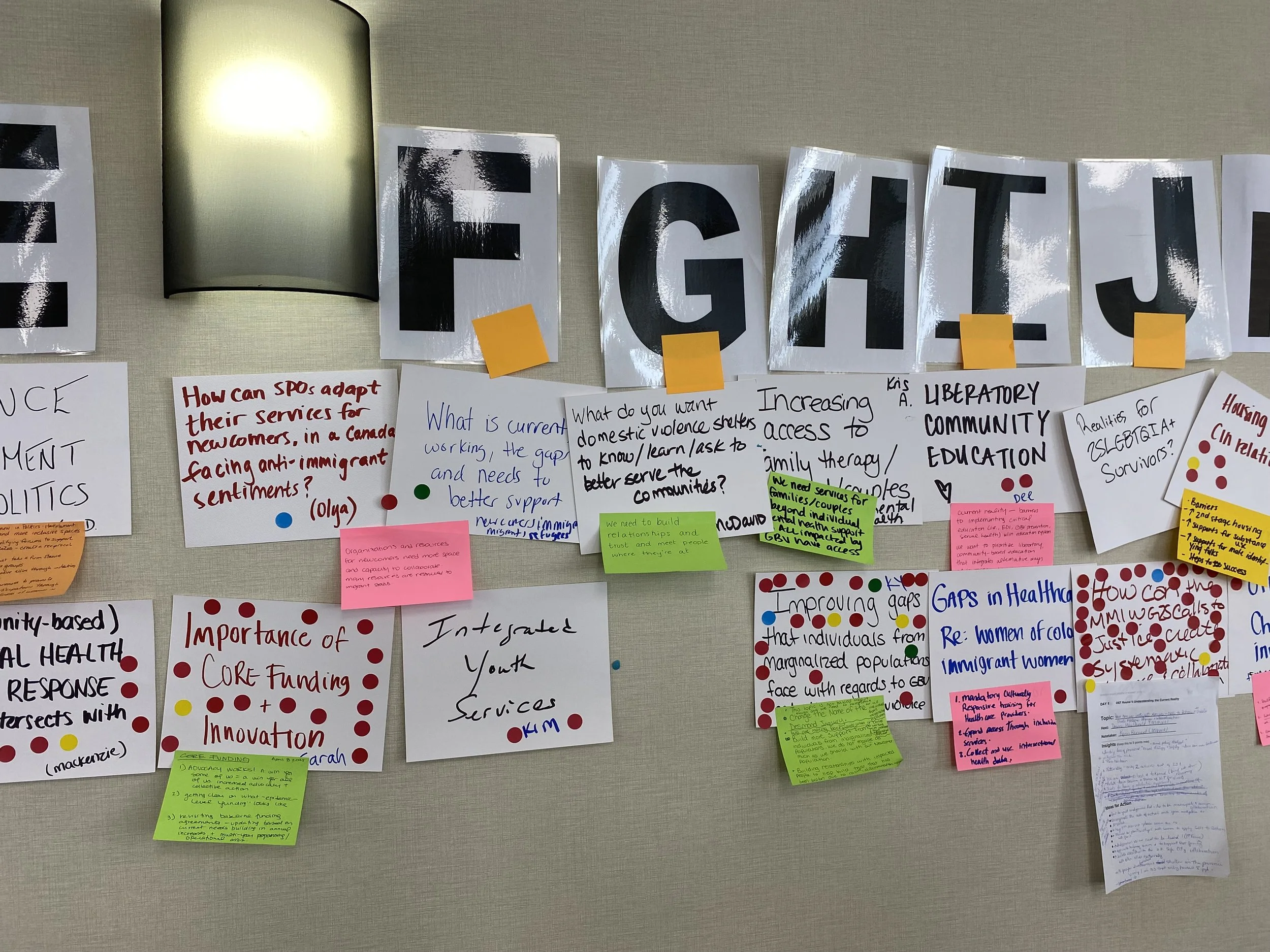GBV Summit: From Epidemic to Action
Be the Peace Institute and Partners*
Funding from Nova Scotia Status of Women
April 7-8, 2025 | Oak Island Resort & Conference Centre
*scroll on to see the complete list of our partners
Logo design: Claire Worthington Zemaitis
On April 7- 8, 2025, 160 people from a variety of communities, social identities, lived experiences and professions across the GBV sector in Nova Scotia gathered at Oak Island Inn for the GBV Summit: From Epidemic to Action, to listen, learn, connect and refresh.
We need to come together now. We can all get better at simultaneously honouring our beautiful difference and our common humanity. Recognizing shared purpose across contexts, organizations and orientations helps us to formulate innovative strategies to address the GBV epidemic at the systems level.
Through a mixture of roundtable presentations, somatic grounding, Open Space Technology conversations, breaking bread, and a bit of fun (karaoke, painting and yoga), we came together and continued to develop sector-wide strategic priorities.
The material was often heavy, speakers’ viewpoints sometimes triggered, and we are all capable of inadvertently causing harm. We mourn our mistakes, renew our commitment to do better, and make space for discomfort.
Elders from indigenous, African Nova Scotian and women’s sector communities lent us their guidance, wisdom and kindness over the two days. Laughter and song offset moments of despair and outrage. Friendships were struck and a few Big Ideas were born.
Periodically taking moments like the one provided by the 2025 Summit allows for rejuvenation, sense-making and the strengthening of relationships and trust across the sector.
No one organization or profession, acting alone, can solve the wicked problem of GBV. This is a time for collective action. We have the research and understand the job to be done. Now we must do it, together.
A surprise April snowstorm cut short our plan for robust action conversations, ending early on Day 2 so participants with long drives could get home. The work will continue through ongoing and new Working Groups; exploring issue-specific partnerships; and perhaps hosting a small strategic planning session in the fall.
Read on and stay tuned for more including our Summit Report!
Summit Program
Summit Welcome & Agenda
Day 1
Day 1 began with an optional smudging thanks to Denise John and Krista Fennessey from Mi’kmaw Native Friendship Centre. Sue Bookchin, Be the Peace Institute, led the welcome which included a land acknowledgement, a song and blessing from Elder Deb Eisan and an African/Black Nova Scotian communities acknowledgement and libation with Kyiaisha Benton, NS Association of Black Social Workers and Elder Liz Cooke-Sumbu. Elder Nancy Gray also shared her role and thoughts as a “Gender-Based Violence Sector Elder”. We remembered and honoured the 11 people killed by intimate partner homicide since it was declared an epidemic in Nova Scotia with a moment of silence. Thanks to Trauma Therapist and GBV Advocate, Kristina Fifield, care was taken to offer a grounding and reminder to care for self and others throughout the 2 days. Participants were led through a co-creation of relational agreements to better ensure a “safe enough” and inclusive space for all. We shared information about support people and spaces on site as well as a prayer room and inclusive washrooms. Hopes and fears were shared as a way of acknowledging tensions and expectations. Sue and Krista Smith shared a song “Dona Nobis Pachem” (Give Us Peace) to conclude our opening.
Major thanks to our photographers Julie Veinot, Onyedika Henry and Alexandria Acton Bond!
Sue Bookchin, BTPI
Elders - Liz Cooke-Sumbu, Deb Eisan & Nancy Gray
Kyiaisha Benton leads us through a libation
Kristina Fifield leads us through relational agreements and a grounding
Hopes
Support Room
Fears
Support Room
Roundtable 1: Seeing GBV Through a Systemic & Intersectional Lens
Round Table 1, moderated by Krista Smith, explored GBV through a systemic and intersectional lens, emphasizing the need to transform the systems that perpetuate oppression and exclusion. Panelists Robert Wright, Carmel Farahbakhsh, El Jones, and Cheryl Simon highlighted that current systems, rooted in colonialism and patriarchy, are not broken but designed to serve those in power, and require a shift towards more inclusive, human-centered approaches. They stressed the importance of practicing intersectionality, recognizing the overlapping oppressions faced by marginalized groups and the need to challenge power structures. The identity of ‘marginalized’ itself comes from a settler colonial/white bias. Transformative, community-led change was emphasized as essential, with a focus on avoiding harm replication and building relationships across movements. Some possibilities for reform included removing police from all 911 calls, reimagining legal frameworks, redistributing resources to communities and youth and recognizing Indigenous self-determination. Ultimately, the discussion called for confronting discomfort and fostering solidarity to address GBV and systemic violence through collaborative, care-centered efforts.
Panelists Robert Wright, Carmel Farahbakhsh, El Jones, and Cheryl Simon with Moderator, Krista Smith
Update from Scaling the Summit Working Groups
BTPI Project and Resource Coordinator, Stacey Godsoe, facilitated a discussion with individuals involved with the six working groups that evolved out of Open Space Conversations at last year’s International Women’s Day Summit March 6-7, 2024. Six very active coalitions of strong, trusted partnerships across the usual boundaries were generated from the 2024 Summit OST conversations that identified strategic actions needed.
The six working groups and the panelists were:
GBV Sector Coordination - Olya Stepanenko & Krista Smith
Population Health Approach to GBV Prevention – Lila Pavey & Jenna Hopson
GBV Advocacy – Kristina Fifield & Stacey Godsoe
Violence & Harassment in Politics – Kacey DeLong & Paula Raudales
Healing Retreats for Sector Wellbeing – Nicole Robson & Kristina Fifield
Summit Planning - Stacey
These six working groups continue to meet regularly. They focus on addressing GBV-related issues in ways that are inclusive of community-based organizations dedicated to under-served population groups across identities of gender, race, Indigeneity, culture, ability, social status and locations. Working groups also work to build committed partnerships among community providers and advocates, government actors and departments, survivors, academic researchers and anyone with a stake in addressing the GBV epidemic in Nova Scotia.
To learn more about these and other emerging open groups thanks to additional funding from NS Status of Women Office, go to our Scaling the Summit project page.
Panelists from the STS Working Groups
Stacey Godsoe, BTPI
Roundtable 2: Lived Expertise - First Voices Speak
Round Table 2, facilitated by Kristina Fifield, featured four survivors sharing their personal experiences navigating legal and other systems while escaping situations of GBV. Diverse participants, from Queer, African Nova Scotian, Indigenous, and Newcomer communities, offered raw and difficult stories highlighting the urgent need for reform in systems such as police and the criminal justice system, social services, and child protection. Common themes included systemic discrimination and retraumatization, victim blaming, the constant threat and fear of losing children to child protection services, and the ongoing pain and danger of co-parenting with abusive ex-partners. Survivors emphasized the need for trauma-informed, culturally competent, and non-performative support systems that center survivor choice in decision-making and hold perpetrators accountable. They shared personal definitions of healing, ranging from reclaiming autonomy and cultural traditions to finding support in relationships and art. All participants now work with nonprofits supporting GBV survivors, offering hope and guidance to others as they navigate similar struggles.
Open Space Conversations Round 1: Understanding the Current Reality
Summit facilitators Tania Cheng and Teri Brezner introduced Open Space Technology (OST) a participant-led process to foster dynamic conversations, allowing ideas to cross-germinate and inform priority next steps. Participants had full agency to choose topics, lead, listen or move between discussions. In Round 1, the theme focused on understanding the current reality of the GBV epidemic. Topics included the intergenerational nature of GBV, barriers to reporting within marginalized communities, updates to curricula for educators, engaging men and boys in prevention efforts, and addressing violence and harassment in politics. Participants also discussed gaps in services for newcomers, shelters' roles in community engagement, improving access to counseling services, and the realities of 2SLGBTQIA+ survivors. Additional conversations included support for those facing housing insecurity due to intimate partner violence, improving first-response strategies, embedding trauma-informed practices in GBV organizations, and the role of Indigenous Friendship Centres in supporting families affected by GBV. These conversations reflected a collective effort to explore the complexities of GBV and build inclusive, actionable solutions.
Summit Facilitators - Tania Cheng & Teri Brezner
Elder Reflections
Elders representing three communities played a central role at the Summit, offering their wisdom, support, and presence at key moments throughout the event. Their reflections highlighted the importance of connection, storytelling, and of care for each other. They encouraged participants to “take up space” and resist the silencing effects of systemic harm. Elder Liz Cooke-Sumbu honored survivors and ancestors calling for guidance and protection. Elder Debbie Eisan, an Ojibway Anishinabe kwe from Batchewana First Nation, shared teachings on love, respect, and interconnectedness, also guiding a grounding exercise after difficult discussions. Elder Nancy Gray, with Kristina Fifield, continued to help set the Summit’s intention, fostering self-care and revisiting relational agreements to prevent and repair ruptures. Denise John, "Woman of the Shimmering Water," offered smudging throughout the Summit. These Elders and guests provided cultural and spiritual grounding, helping participants navigate the heavy topics of GBV with resilience, care and solidarity.
Elder Nancy Gray
Elders Liz Cooke-Sumbu and Deb Eisan
Evening Activities
After a very full Day 1, participants enjoyed dinner together and were entertained by an impromptu Open Mic Karaoke hosted by Kyiaisha Benton and Onyedika Henry. Other optional evening activities included singing with Sue & Krista, a Fire Circle hosted by Elder Deb, Create and Be (with paint) hosted by Robin Cunningham and a Soothing circle with Kristina.
End of Day 1 - Graphic Facilitation
End of Day 1 graphic encapsulation thanks to Bria Miller, of Bria Makes Things
Day 2 - Morning Circle
Participants expressed gratitude for the Summit’s thoughtful structure, which helped manage heavy content. Some highlighted the lack of support for women who use drugs or are homeless, noting stigma and a focus on "worthy victims" and the need for services that meet people where they are, including for criminalized women and those exiting prison into unsafe environments. Other issues included the need for long-term core funding, especially for Indigenous and Black communities, youth prevention programs, support for survivors of trafficking, and services for men who cause harm. Attendees were urged to learn about the MMIWG2S Calls for Justice and the origins of the red dress movement.
Roundtable 3: Updates & Actions from Government Partners
Government leaders across departments shared updates on their responses to GBV, emphasizing collaboration, trauma-informed approaches, and the importance of centering lived experience. Panelists shared that departments are working together more holistically through thematic collaboration teams focused on GBV/IPV, community safety, and policing reform. Key initiatives include funding for shelters and prevention programs, policy shifts toward more human-centered, culturally competent services, and the implementation of new practice frameworks—especially in child and family services—to reduce harm and support early intervention. Leaders acknowledged past and ongoing system harms, the need for long-term core funding (not just project-based), and committed to including first-voice expertise in decision-making. Programs like GuysWork, high-risk DV protocols, and public health campaigns targeting healthy masculinities are part of a broader effort to intervene early and systemically. While change is slow, speakers expressed hope in the growing relationships between government and community, with a shared commitment to building more responsive, inclusive systems.
Heather Ternoway, Nicole Johnson Morrison, Josie McKinney, Tracy Embrett, Dawn Sherry, Rhonda Fraser, Kim Barro, Sadie Watson, Cynthia Carroll and Lisa Greenough representing multiple departments in government addressing GBV with moderator Sue Bookchin.
Open Space Conversations Round 2: Opportunities for Systemic Change and Collaborative Action
On Day 2, participants built on earlier discussions by exploring opportunities for systemic change and cross-sector collaboration in how we can more effectively address GBV. Conversations focused on areas such as reforming child and family wellbeing practices, expanding Scaling the Summit working groups, and strengthening government–community partnerships through the Mass Casualty Commission Recommendations and the Community Engagement Framework. Other topics included improving crisis response at the intersection of mental health and GBV, securing core “epidemic-level” funding, integrating youth services, and centering the experiences of marginalized populations. Participants also explored culturally responsive healthcare, implementation of MMIWG2S Calls for Justice, engaging men and boys in prevention, and increasing supports for 2SLGBTQIA+ communities. These dialogues reflected a shared commitment to coordinated, inclusive, and sustained action for systemic transformation.
“Dotmocracy”: Prioritizing Our Actions
Following our final Open Space round, participants reviewed conversation notes and selected their top priorities using sticky dots. From Round 1, the top priorities were Engaging Men, Preventatively (22 votes), Housing Crisis & IPV (7), and Curriculum Updates & Resources (P–12) (6). In Round 2, the highest priorities emerged as Implementing the MMIWG Calls to Action (32 votes), Centering Marginalized Experiences (22), Core Funding & Innovation (16), and Government & Community Partnerships (10) leading. Notably, the top priorities from each round were unrelated, reflecting evolving participant focus. The next step will be to develop action plans based on the Round 2 priorities.
To see the full set of Open Space Conversation topics, summaries and dotmocracy results, click here.
Closing Circle
The GBV Summit closed with reflections of gratitude, hope, and a renewed sense of purpose. Participants shared critical feedback for the planning team, emphasizing the importance of respectful inclusion. Many noted that conversations held over the two days were groundbreaking, elevating diverse voices and meaningful connections. Though the work is often isolating and overwhelming, attendees expressed feeling re-energized and reaffirmed in their commitment to GBV work. The shared message was one of community, collective liberation, and the power of gathering across difference. Sue and others acknowledged the subtle but important shifts from previous years—new faces, deeper presence, and growing hope that change is happening.
End of Day 2 - Graphic Facilitation
End of Day 2 graphic encapsulation thanks to Bria Miller, of Bria Makes Things
Thanks & Appreciation!
We extend our heartfelt thanks to everyone who helped make the Summit possible. This gathering was the result of the dedication, care, and collaboration of many people who contributed their time, knowledge, and energy.
First, we are deeply grateful to the organizers and our expansive and diverse planning team whose vision, coordination, and commitment created the conditions for meaningful and safe dialogue, learning, and connection. Your work behind the scenes made this gathering both possible and impactful.
We also wish to honour the event Elders, Elder Deb Eisan, Liz Cooke-Sumbu, and Nancy Gray, who shared their wisdom, guidance, and grounding presence throughout the Summit. Your reflections, teachings, and cultural leadership helped shape the spirit of the gathering and of our collective responsibility for safety, care and action to address GBV in thoughtful and culturally grounded ways.
Our sincere appreciation goes to the support team and volunteers from Avalon Sexual Assault Centre, Mi’kmaw Native Friendship Centre and the Nova Scotia Association of Black Social Workers who held space with compassion and care, and to Kristina Fifield who through her trauma-informed guidance, facilitation, and support in creating safer spaces, helped ground the gathering and better ensure that participants were supported while engaging with complex and often difficult conversations. Through trauma-informed and culturally responsive support, you all helped ensure that participants could engage in challenging conversations while feeling supported and safe.
We are grateful to the participants and to the panelists, whose presence reflected the diversity of communities and sectors working to end gender-based violence. The voices, experiences, and perspectives shared by individuals from across Nova Scotia strengthened our collective understanding and commitment to action.
Finally, we offer our deepest respect and gratitude to the survivors who bravely shared their stories and lived experiences. Your courage, honesty, and leadership moved us profoundly and reminded us why this work matters. Your voices continue to guide the path forward.
Thank you all for contributing to a gathering rooted in care, learning, and collective action. Together, we are building the relationships and momentum needed to move from epidemic to action.
Just some of our amazing 23-person planning team!
This event was made possible in collaboration with …
To learn more, check out the results of the Participant Feedback Survey, and to learn more about the diversity of participants, check out our GBV Summit 2025 Demographics Report.
Stay tuned for more outputs including the full Summit Report…!


